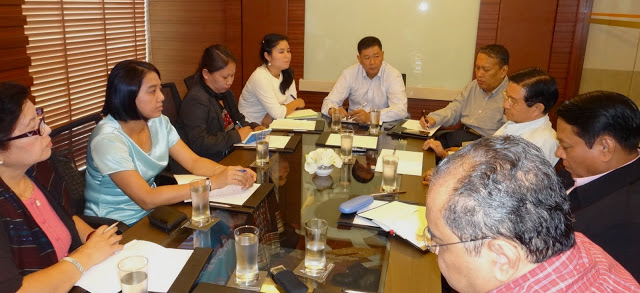The Burmese government’s chief peace negotiator, Aung Min, suggested that women’s involvement in the ongoing peace process will be on the agenda during upcoming negotiations.
The minister, who spoke to DVB at an art exhibition in Rangoon last Saturday, said future meetings with ethnic armed groups, geared towards achieving a nationwide ceasefire and long term political settlements, will devote some attention to the as yet near total absence of female voices in the historic discussions.
Thailand-based Women’s League of Burma (WLB), an umbrella group of 13 women’s rights organisations, welcomed the minister’s remarks. However, WLB asserted that women who take part in the peace process should be individuals who truly represent women in the country.
“This is good news for us. However, we are concerned that there is a tendency for women to be invited to meetings just for the sake of their presence — only to sit at the table without participating,” said Mi Sue Pwint, a WLB senior official.
[related]
“I would like those who are invited to peace talks to be women who really represent women’s societies and are actively focused on the subject; those who will monitor and provide feedback on developments over time,” she added.
Mi Sue Pwint said that women have born much of the brunt of the country’s on-going civil wars.
WLB member groups have been educating women for better political knowledge — priming them for a role in state affairs through skill training programs.
The 88 Generation Peace and Open Society deputy-women’s coordinator, Mee Mee, said it is necessary for government officials to undertake practical measures in order to keep promises made by senior government leaders.
“Officials such as the President and Union ministers make remarks promising changes, but they need to turn words in actions – we are hopeful to be able to take part in the peace process and make practical inputs,” she said.
Mra Raza Linn is chairperson of the Rakhine [Arakan] Women’s Union and the sole female member of the Nationwide Ceasefire Coordination Team (NCCT) — which represents ethnic groups engaged in talks with the government. Mra Raza Linn confirmed that women have had little to no role in the ceasefire talks.
NCCT committee member Hkun Okker believes that the participation of women would lead to more successful negotiations. However, he suggested that the presence of women in future meetings is dependent on the decisions of individual groups and who they appoint to attend the meeting.
“All we can do is to urge the groups to appoint female representatives to the meetings. Whether they do or not is only up to them,” said Hkun Okker.



